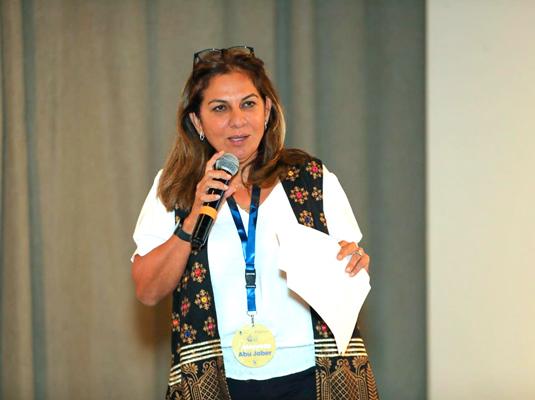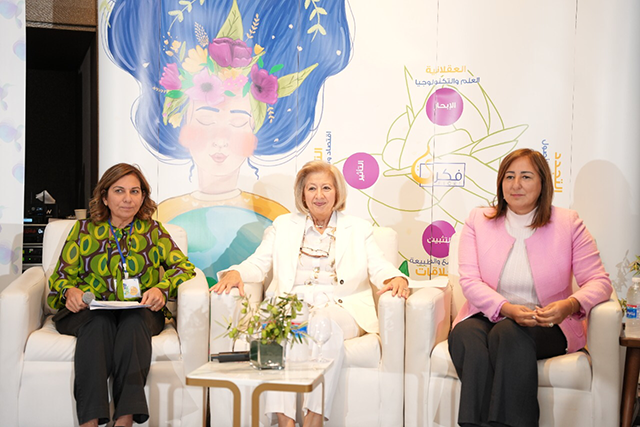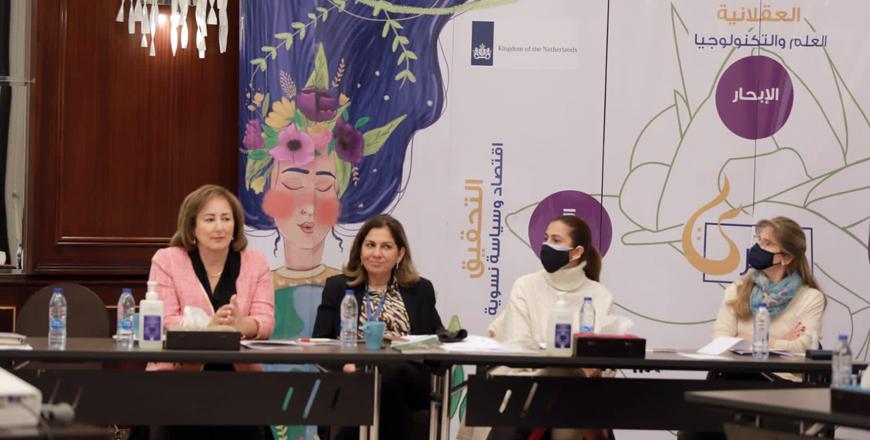You are here
Feminist centre’s training programme helps women implement policy change
By Batool Ghaith - Sep 16,2021 - Last updated at Sep 16,2021

Mayyada Abu Jaber, the FICRI project manager, speaks during the third fellowship programme launch in Amman on Tuesday (Photo courtesy of FICRI)
AMMAN — The Feminist Integral Centre for Research and Innovation (FICRI) launched the third fellowship programme on September 14-15 in Amman, which included extensive training on research dissemination strategies.
After two fellowship programmes launched in March, the third fellowship programme titled “Strategies to Disseminate Research for Policy Influence”, was held in cooperation with the Brookings Institution and the Embassy of the Kingdom of the Netherlands, according to the FICRI.
“This fellowship programme aims to teach policy influence for a group of young leaders from various academic fields such as journalism, law, social sciences, as well as content creators from all over the Kingdom,” said Mayyada Abu Jaber, the FICRI project manager.
Abu Jaber, who is also the founder and CEO of JoWomenomics, noted that FICRI adopts both the scientific and anthropological social science approach to conduct studies.
“These fellowships and workshops provide new generations with additional information about feminist work methods. As a kind of alliance between the fellowship participants, we were able to build a group for them where they can work together for change,” Abu Jaber told The Jordan Times during an interview.
Abu Jaber pointed out that it is highly important to engage the next generation in achieving women empowerment. “Once those young people are engaged in the discussions, they will be engaged in the action. They should not be an after-thought,” she said.
According to Abu Jaber, feminism started radically and has changed over time. “We need to identify our feminism as Arabs and unite it as a concept,” she said.
Regarding women’s participation in Jordan’s workforce, Abu Jaber said that there is a lot being done to change policies to help women and make it easier for them to enter the labour market, such as improving transportation.
“These are objective barriers, but in reality the root of the problem is our subjective belief system that we need to work very hard to change,” she continued.
As for future plans, Abu Jaber said that the FICRI will start working on creating an integrated plan to empower women socially by amending the social security laws and achieving holistic integral development.
Batoul Alqasem, an FICRI project assistant and fellow, indicated that involving young people, whether male or females, is the first step towards gender equality.
“We can achieve economic gender equality when both men and women realise the importance of both their roles in society,” she told The Jordan Times during an interview.
Qasem stressed the importance of involving people outside Amman, in different governorates around the Kingdom. “Change should happen everywhere, not only in the capital or in one place for specific people. This is why we brought participants from the south of Jordan to this fellowship, which does not happen often,” she added.
Qasem noted that there needs to be a database to help the young generation learn more. “There are lots of different ideas and ideologies about feminism. Knowledge is power, which is why it is very important for everyone to learn about feminism and gender equality,” Qasem said.
“Unfortunately, lots of people still do not understand the advantages of women’s involvement in the economy and there are many laws that are not in favour of working women. This is why we are behind in the Middle East region in that matter. We need to work on improving our policies,” Qasem highlighted.
The FICRI is an independent, non-partisan regional think tank committed to holistic, integral and feminist approaches to conducting research in order to reach a feminist economy in the Arab world, according to the organisation.
Related Articles
AMMAN — The Feminist Integral Centre for Research and Innovation (FICRI) has recently launched its Fellowship Programme to empower the youth
AMMAN — Shared responsibility for Jordan is key to building a culture of peace, said Culture Minister Haifa Najjar on Wednesday.Najjar’s rem
AMMAN — Jo Womenomics, through the Feminist Integral Centre for Research and Innovation (FICRI), launched its position paper on the Social S


















